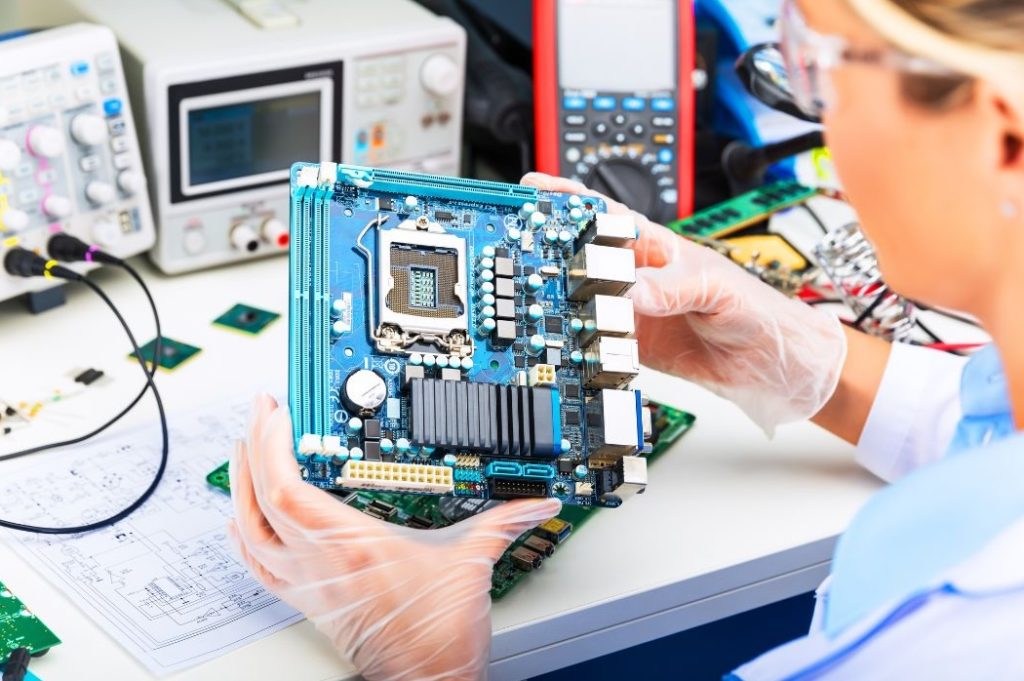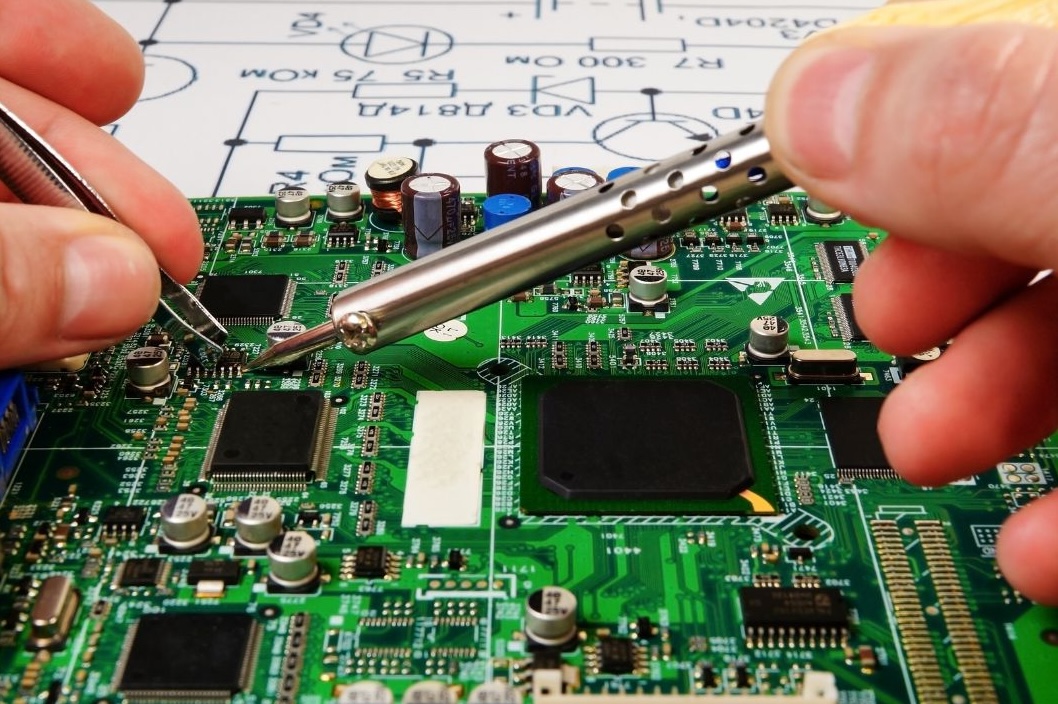Within such a competitive sector, where the electronics industry constantly evolves, efficiency and speed are crucial to the success of a business. Companies and individuals want their devices to be compact yet advanced, which means cost-effective, efficient manufacturing processes are in high demand.
Outsourcing tasks can have various benefits when done by a specialised professional. A Contract Electronics Manufacturer (CEM) is one such professional and can support your electronic manufacturing process by being affordable and having a fast turnaround.
But what is a CEM, and what does it do?
This blog explores the role of a Contract Electronics Manufacturer and how electronics consultancy can benefit your industry.
What is a Contract Electronics Manufacturer (CEM)?

Also known as an ECM, a Contract Electronics Manufacturer (CEM) is a company that creates electronics based on instructions from an Original Equipment Manufacturer (OEM). OEMs usually develop a product but outsource at least part of the manufacturing process.
CEMs offer a spectrum of services, from producing individual electronic components to completing end-to-end assembly responsibilities. Various industries utilise this service to help manufacture products, as mentioned below.
What Industries Use Contract Electronics Manufacturers?
Several industries use Contract Electronic Manufacturing companies to help develop products. These industries include the following:
Electronics Industry
Naturally, electronics companies leverage CEMs to enhance their production capabilities, ensuring the rapid assembly of electronic components for different devices.
Automotive
CEMs aid the automotive sector in producing basic components and external electronics for vehicles, including radios, dashboard parts, parking assistance devices and tubing.
Robotics
Robotics manufacturers can find it challenging to keep up with the current demand for products, specifically with the rate at which the industry is developing. To combat this, robotics manufacturers use CEMs to help construct components and parts.
Pharmaceuticals & Medical
CEMs play a crucial role in producing electronic components for medical devices, ensuring precision, reliability, and compliance with regulatory standards in the medical sector. Equally, for the pharmaceutical industry, CEMs produce raw chemicals required for various products.
The aerospace, defence and photonics industries also commonly use CEMs.
Factors to Consider When Choosing a CEM

Selecting a suitable Contract Electronics Manufacturer (CEM) is a critical decision that directly impacts your electronic product’s quality, efficiency, and success. You must consider several key factors to determine which CEM to use, including the following:
Manufacturing capabilities and capacity
Thoroughly review a CEM’s manufacturing capabilities and capacity, which are critical elements that can significantly impact the success of your project.
– Capabilities Beyond Your In-House Resources
Identify areas where the CEM can augment your in-house capabilities. A valuable CEM brings specialised skills and resources that complement your team, enhancing overall project proficiency.
– Equipment and Expertise
Evaluate the CEM’s equipment and technological knowledge. Advanced machinery and a specialised team signify the ability to handle complex manufacturing processes and ensure the production of high-quality electronic components.
– Comprehensive Add-On Services
Look for a Contract Electronic Manufacturing company offering comprehensive add-on services like assembly to streamline your supply chain. Consolidating vendors simplifies coordination and enhances efficiency throughout the manufacturing process, from component production to final product assembly.
Experience and expertise in specific industries or technologies
When selecting a Contract Electronics Manufacturer (CEM), the depth of their experience and expertise is vital.
– Longevity and Manufacturing History
Investigate the CEM’s manufacturing tenure. A longstanding history displays their resilience and adaptability in the electronics industry, providing a sense of reliability and stability in their operations.
– Industry-Specific Focus
Determine whether the CEM specialises in your industry. Some excel in general manufacturing, while others possess niche expertise. Consider which option would best suit your business and manufacturing process.
– Reputation with Leading Suppliers
Assess the CEM’s standing with prominent suppliers in your industry. A good reputation signifies strong relationships, access to quality materials, and reliable product quality. Partnering with a CEM with a reputable status among industry suppliers enhances the likelihood of receiving quality components for your electronic products.
Quality assurance and certifications
Ensuring stringent quality standards is non-negotiable. When selecting a CEM, explore the following considerations:
– Mitigate Compliance Risks
Reduce the chances of compliance issues by prioritising a CEM with a robust quality assurance framework. Electronic manufacturing demands adherence to industry regulations.
– Ensure Quality Components
Scrutinise the CEM’s quality management systems. A well-defined and implemented quality control process signifies their dedication to delivering products of the highest standards, reducing the likelihood of defects and ensuring the reliability of your electronic components.
– Certifications from Appropriate Bodies
Verify if the CEM holds certifications from relevant regulatory bodies. Industry-recognised certifications validate their commitment to excellence and compliance with widely recognised standards, ensuring that your electronic products meet or exceed the stringent criteria established by authoritative bodies. Industry-specific certifications further underscore their specialised competence in addressing the unique challenges of your sector.
Geographic location and proximity to target markets
The geographical location of your chosen manufacturer holds strategic significance. Here’s what to consider when assessing the geographic fit of a CEM:
– Local Proximity to Your Business
Research whether a local or more distanced CEM would benefit your business. Local CEMs can provide a quicker turnaround time and offer face-to-face meetings, whereas offshore alternatives can be cheaper but bring potential language barriers.
Cost considerations and pricing models
Working with a Contract Electronics Manufacturer (CEM) means you must think about cost considerations and pricing models, including the following:
– Comprehensive Cost Evaluation
Extend your assessment beyond initial manufacturing costs, including shipping and additional fees. A holistic evaluation ensures transparency in understanding the total cost of manufacturing, preventing unforeseen expenses and promoting financial security.
– Balancing Budget and Quality
While budget considerations are crucial, compromising on quality can have profound repercussions. Find a balance between cost-effectiveness and the assurance of quality. Electric contract manufacturing that aligns with your budgetary restrictions without compromising on the integrity of components protects the long-term success of your electronic products.
– Scrutinising Component Quality
Examine the quality of components produced by the CEM. Request and review samples of their work to gauge precision and reliability. The repercussions of inadequate components impact the performance of your final product and, consequently, your brand reputation.
What is the Process of Working With a Contract Electronics Manufacturer?

Working with a Contract Electronics Manufacturer (CEM) involves a structured process to bring your electronic product from concept to market efficiently. You do not need to use every step, only the ones your business requires. The key stages include the following:
1. Initial Consultation and Project Evaluation
- Define your project goals and specifications.
- Discuss manufacturing requirements and expectations.
2. Design for Manufacturability (DFM) and Prototyping
- Collaborate on designing products optimised for efficient manufacturing.
- Develop prototypes to test functionality and identify potential improvements.
3. Manufacturing and Production Phases
- Execute the production plan, ensuring adherence to timelines and quality standards.
- Utilise the CEM’s expertise in mass production processes.
4. Testing, Quality Control, and Inspection Processes
- Implement rigorous testing protocols to validate the functionality of electronic components.
- Enforce quality control measures at every stage to guarantee product reliability.
5. Packaging, Labelling, and Shipping Logistics
- Collaborate on packaging design and labelling requirements.
- Establish efficient shipping logistics for timely delivery to end-users.
- Tailoring your engagement with the CEM allows you to choose the specific stages that align with your requirements.
What are the Key Advantages of Using a Contract Electronics Manufacturer?
Working with CEMs can offer various benefits, including the following:
Cost savings and operational efficiencies
CEMs with specialised knowledge, state-of-the-art tools, and advanced facilities can streamline projects and curb material costs. These companies can also minimise waste and augment overall operational efficiency. Their support and expertise are invaluable when addressing equipment failures, averting potentially expensive setbacks.
Moreover, the convenience of consolidating the entire process under one facility – from initial design to final production – not only enhances communication and coordination but also facilitates a cohesive workflow.
Faster time to market and reduced lead times
With the competitive nature of the electronics industry, fast production times are crucial. CEMs can increase production speed, leading to the following benefits:
– Accelerated Production Processes
CEMs use their expertise, advanced technologies, and efficient production workflows to expedite manufacturing. This acceleration is instrumental in meeting tight deadlines and staying ahead of the competition.
– On-Time Product Launch
Timely production ensures that your products reach the market promptly or ahead of competitors.
Quality control and reduced risk
Collaborating with a CEM brings a heightened focus on quality control, mitigating risks and ensuring the delivery of high-calibre products:
– Stringent Quality Control Protocols
CEMs implement comprehensive quality control checks at every stage of the manufacturing process. Rigorous inspections, adherence to industry standards, and attention to customer specifications collectively produce superior-quality electronic components.
– Adherence to Industry Standards
The commitment to meeting industry standards and customer specifications is integral to UK Contract Electronics Manufacturer operations. This adherence ensures that the final products meet regulatory requirements and align with end-users’ expectations, encouraging trust and brand credibility.
– Risk Mitigation
Businesses significantly reduce the risks of failures and defects by entrusting the manufacturing process to a CEM.
Partnering with a Contract Electronics Manufacturer (CEM) is a strategic consideration in the evolving electronic manufacturing industry. These companies can support your business and production processes from cost savings to accelerated time-to-market and provide various benefits.
If you want help with your electronics manufacturing, Altimex offers tailored solutions to support your needs. With our extensive experience and specialised knowledge, we can provide the electronic components you need for your business. Contact us today for more information about how Altimex can help your business.


